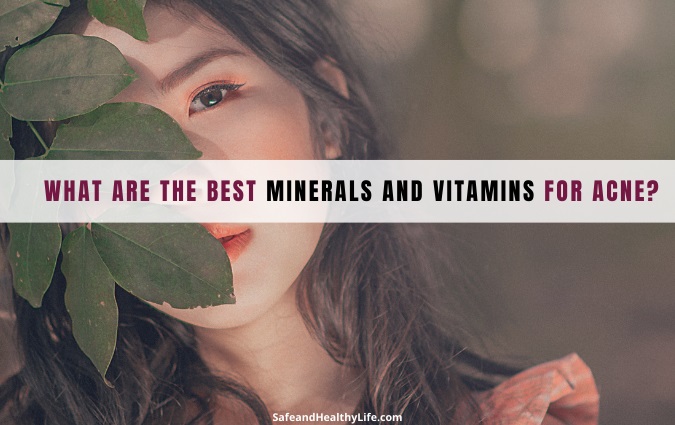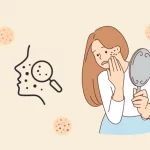
There is no age limitation to acne infection. Both children and adults could have this skin reaction.
Though, it has been recorded to be more prevalent during adolescence and menopause. Statistics also show that about 50 million people are affected by acne annually in the United States.
Hormonal imbalance in humans can be a cause of acne. During this phase, the oil glands produce excess oil. It results in the clogging of the skin pores and the growth of bacteria or pimples.
Traces of acne on the skin are in different shapes and depths. It could come as cysts, blackheads, whiteheads, or nodules.
Antibiotics like tetracycline, Vitamin A drugs like isotretinoin, and benzoyl peroxide, are medical treatments for acne. These medications have been backed up with adequate research.
However, there is an alternative to acne medication, which is a natural treatment. Some people who have acne will want to seek this alternative to acne medications. They are natural treatments found in oral vitamin and mineral supplements.
Below are some natural remedies for acne that can be an alternative to acne medication.
1. Zinc for acne treatment
Zinc is very active for acne. Zinc performs a lot of functions in the body, including metabolism, reproductive functions, immune growth, and wound repair. For severe acne treatment, oral zinc sulfate and zinc gluconate are highly effective.
A study from 2014 observed the levels of Zinc, Vitamin A, Vitamin C, and Vitamin E in the blood of people with and without acne.
The study showed that the amount of these vitamins and minerals in the blood of people with acne was significantly lower than the people without acne. The conclusion was that diet, rich in these nutrients can be used as an alternative to acne medication.
Zinc helps to regulate the production of sebum (oil) in the body. Sebum is produced from the sebaceous glands (oil glands) in our bodies.
Although Sebum is good for the skin, excessive sebum in the body is bad. It makes the skin too oily and gives an avenue for acne to develop.
Hormonal changes can lead to the overproduction of sebum. With Zinc, the oil glands can moderately produce sebum.
Food with the most zinc is seafood, red meat, nuts, a bean as well as dairy products such as milk and cheeses. The recommended daily dose of Zinc for male adults is around 8 mg and 11 mg for adults female.
2. Magnesium for acne
Magnesium has anti-inflammatory effects on acne. It helps to maintain a healthy glutathione level in the body. Magnesium is a mineral that constrains the excess production of the stress hormone (cortisol).
Generally, magnesium helps to curtail stress that can result in the outbreak of acne to the skin. Food is rich with Magnesium: avocados, pumpkin seeds, bananas, whole grains.
You can take also food supplements as tablets that contain only magnesium or multivitamins. This way you can be sure you will not suffer from a lack of this mineral.
3. Omega-3 as an alternative medication
Omega-3 supplement is majorly found in oily fish. The functions of this fatty acid are numerous to the body.
It can be used as a protection against skin inflammation and treatment for all levels of acne infection. Omega-3 also promotes heart health and healthy aging.
PGE2 and LTB4 are two chemicals responsible for acne breakouts which Omega-3 can prevent.
4. Vitamin A
Vitamin A is an anti-oxidant and effective acne treatment. Vitamin A removes all forms of substances that can cause skin aging. It is good for healing the skin. Vitamin A is recommended for acne treatment because it can remove dead and clogged skin cells.
Vitamin A also has other functions such as providing healthy vision, supporting the immune system, promoting the production of red blood cells.
A lot of food supplements combine Vitamin A and other vitamins and minerals, needed with the fight against acne.
The foods that contain the most Vitamin C are beef, sweet potatoes, carrots, pumpkin, broccoli, and milk.
5. Vitamin C
Vitamin C contains properties that not only heal cold and flu but also protect the skin’s health.
Vitamin C is responsible for the elasticity and collagen synthesis of the skin. It also helps the skin to react to environmental stress. It has anti-inflammatory properties that can prevent and treat acne.
They are a lot of ways you can take Vitamin C. The most common of them are like pills or liquid Vitamin C.
Plenty of foods also contain it such as citruses – lemons, oranges, grapefruits, kiwis; chilly paper, tomatoes. One glass of fresh juice per day will give you enough of the vitamin, needed to fight acne.
About The Author:
Maria Andreas is a health blogger, writing mainly about health. She is a passionate and proven leader focused on empowering consumers as partners in their health through digital information and tools.

![[Adult Acne] Common Causes, Remedies, and Best Treatments Adult Acne](https://www.safeandhealthylife.com/wp-content/uploads/2023/02/Adult-Acne-150x150.jpg)
![[Infographic] Life with Acne: Managing and Embracing Healthy Skin Habits Life with Acne](https://www.safeandhealthylife.com/wp-content/uploads/2023/10/Life-with-Acne-150x150.webp)

